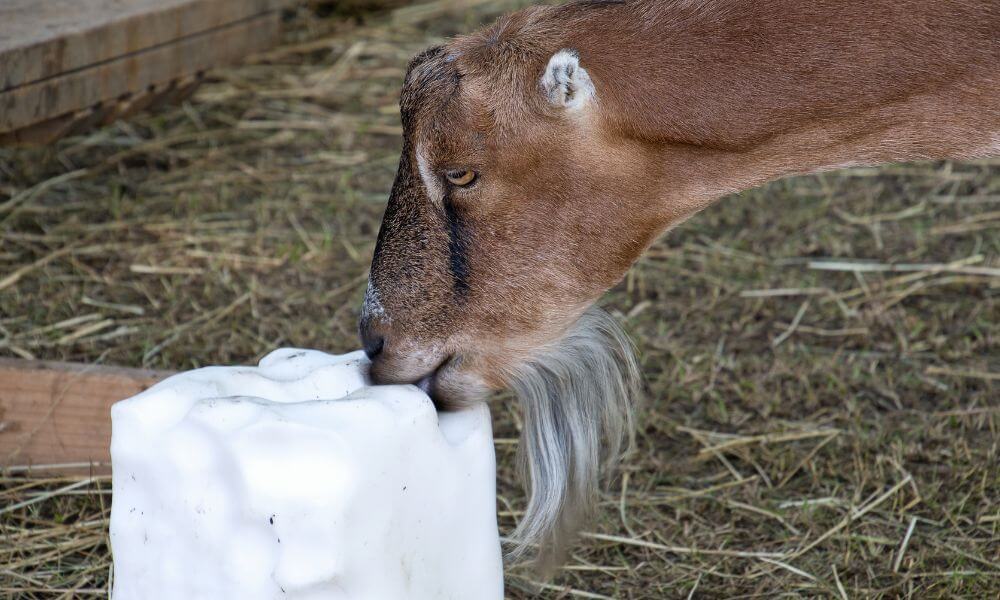So, it’s just the simple fact that goats need these minerals in their diet to get the full range of nutrients.
Salt licks help them maintain a healthy appetite and a healthy weight.
Many ruminants do the same thing, as do other browsers and grazers like deer, sheep, cows, and even elephants.
Let’s find out more.

Why do goats need salt licks?
The simple answer is that they need the minerals in their diet in order to be completely healthy.
Their diet needs the salt and the other minerals contained in the salt licks to get the full range of what they need.
The right minerals serve any number of functions in the body, from the muscles to the nerves, the immune system, and even reproductive health.
It’s also a case of what is natural for them.
Their diets, overall, are somewhat lacking in important nutrients and minerals.
Especially when they live in the wild and don’t have access to whatever food their owners can buy.
Thus, they have a natural instinct to seek out salt licks, and this has served them very well.
That natural instinct carries over to their domestic life.
Salt licks are just good enrichment if nothing else.
But they also provide all these beneficial minerals and other nutrients we have talked about.
There is some debate about the precise nature of the salt licks that are best for them. many advise against mineral blocks, as goats can struggle to use their soft teeth to get any of it off.
A smaller, softer salt lick is better for them.
But do the goats actually crave salt themselves?
Do goats crave salt?
Yes, they do, to varying degrees.
Mountain goats, for example, which are a different species from domestic goats, certainly have a huge appetite for salt.
This is large part of how they survive out in the mountains.
This is also the reason we see them climbing on such precarious ledges—to get the salt licks in the mountain side.
Domestic goats certainly do crave salt, too.
They are natural roamers and ruminants, meaning they have a natural inclination to roam around and try to find a variety of foods.
This includes looking for mineral deposits, and salt licks.
So, you should provide them some salt lick or mineral supplements to satisfy this natural craving and to make sure they get all the balance in their diet that they need.
But what kind of salt do they need?
What kind of salt do you give goats?
You’ll need to provide them with iodized salt, which is important for preventing goiter.
You can buy iodized salt in a number of forms—plain iodized, cobalt iodized, salt and fortified trace mineral salt.
Whatever salt you get them, iodine should be on the ingredient list.
As I said, try to avoid tough mineral blocks.
These are hard for your goat’s softer teeth to break and can even hurt their mouth.
Something soft that they can actually lick and do not have to break up.
How much do they need, then?
How much salt does a goat need?
This will depend on a lot of factors.
Goats’ diets can vary a lot depending on where you are. ideally, your goats should be able to roam a pasture and hut for food on their own.
You’ll need to have a pretty intimate understanding of what is on that pasture, and what valuable nutrients they are getting from it.
It may be that there is a natural source of salt on the pasture, in which case you may not need to provide salt supplements.
On the other hand, they need around 0.5 oz of salt per day, per goat.
If there are no natural salt sources on the pasture, then you should be providing them salt in mineral supplement form.
Is Himalayan salt good for goats?
Yes, but not in the form we buy it for ourselves.
You can get Himalayan salt licks, which boast a number of special benefits for goats.
Either way, Himalayan salt will provide for their basic nutritional needs.
The veracity of the claims of the other benefits are yet to be verified, but Himalayan salt is certainly better than table salt!
You’ll probably have more trouble finding a Himalayan salt lick block, though, so any other will be perfectly fine if you can’t.
Salt is just a very important part of a goat’s diet, then. in the wild, the best way to get the right amount of salt is through direct deposits, rather than being found in other items of food.
So, it’s simply that their natural inclination is to seek out salt deposits, rather than just eating saltier foods.
As I said, this is why we see mountain goats scaling apparently sheer cliffs—for salt licks!
